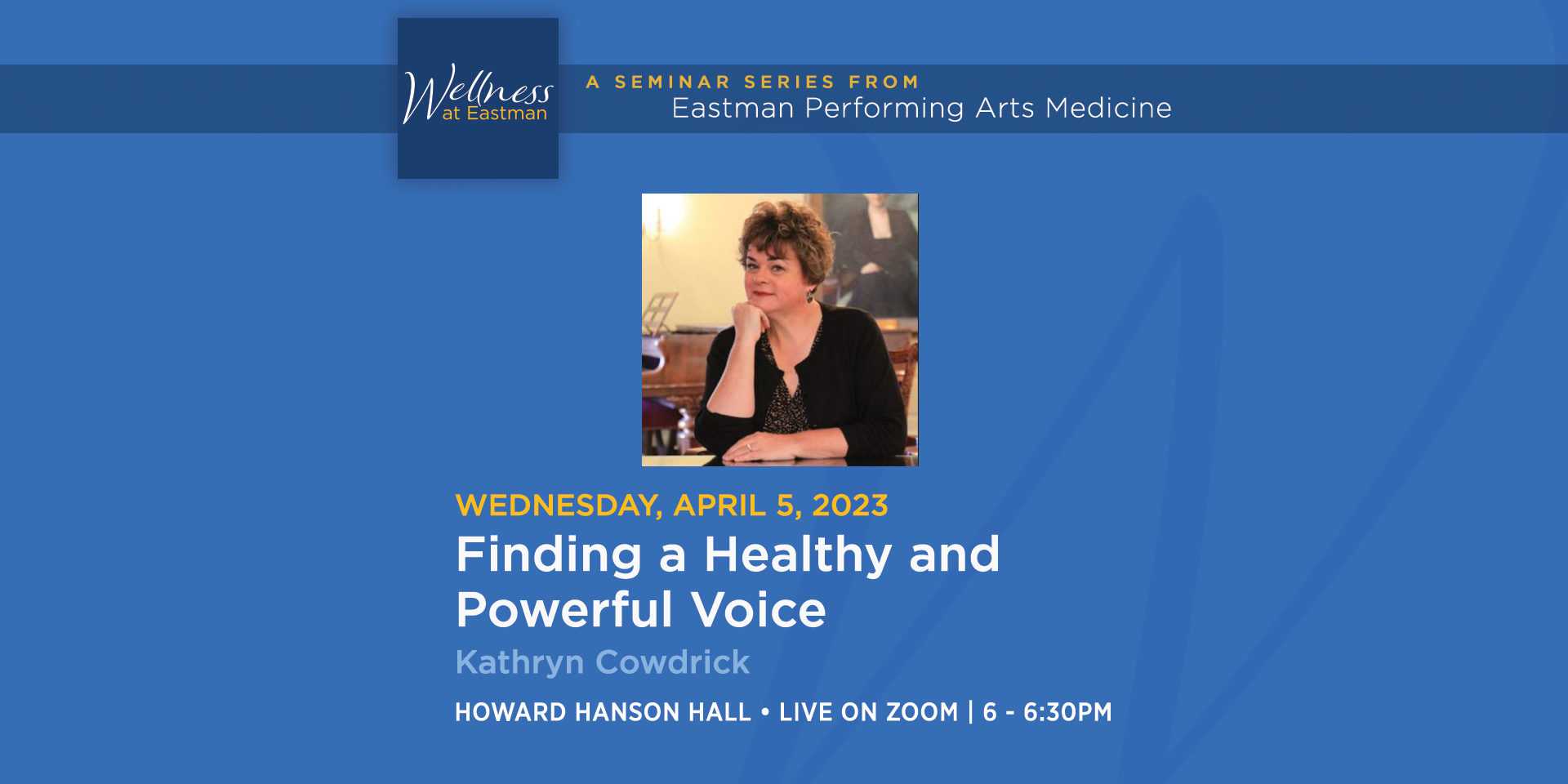Ever lose your voice or go hoarse, right when you have a class to teach, meeting to attend, or concert to sing? Then this week’s Wellness at Eastman presentation on Wednesday, April 5 at 6 p.m. is for you.
This week, vocalist and Eastman professor Kathryn Cowdrick presents a talk on Wednesday called “Finding a Healthy and Powerful Voice” as part of Eastman’s Wellness seminar series. Cowdrick focuses on overall vocal health and longevity, with topics such as how we produce our voice, how to set up a plan to support and present our speaking voice so that our message can be heard, and protocols for good vocal health, stamina, and singing without injury. Because this talk is aimed not only at singers but to speakers, this talk is for anyone who uses their voice professionally, whether that includes singing, teaching, or public speaking.
Senior Writer and Editorial Manager Anna Reguero caught up with Cowdrick to learn more about the presentation:
AR: We all know that singers need to carefully consider their vocal health, but most other people don’t, even when they use their voice professionally (teaching or public speaking). How would learning correct vocal production help non singers?
KC: Germs, viruses, and over use of the voice undermine all of us from time to time. We are also seeing the long term effects of Covid. Singers and teachers and other people who we consider “ professional voice users” are so vulnerable. Who might these other people be? Coaches, actors, lawyers, people who lecture or do customer service or clergy. We hear on television and in Zoom sessions people who present a lot of vocal fry which is an unsupported gravelly kind speaking voice and the important messages CAN get lost when intelligibility or quality of the voice is challenging to the listener.
AR: What kinds of techniques will people learn from your talk?
KC: Singers through their teachers gather a lot of really sound advice on vocal health because it goes hand in had with growing technical expertise and longevity. We teachers teach them not only languages and musicianship but also how to warm up to get ready for a performance and how to practice. We also work with them on how to manage their speaking voice. One would never enter a 5k without warming up the body. The muscles of the larynx and the breathing mechanism need the same tender loving care. There are short protocols that I use each day before starting and this is because I start a lot of days with an hour lecture class and then teach 5 or 6 hours a day non stop with maybe only a 10 minute break in between lessons. There are lots of easy exercises people can do to begin this journey.
AR: Is there anything else you hope that participants take away from your talk?
KC: In the short time I have, I hope to make sure that no one should be shamed with a vocal injury, that we have a wonderful department of otolaryngology and speech pathology at the University of Rochester that takes care of our students and the Rochester community with expertise, and also to let people know how to know how to care for their voice and make it less vulnerable to injury in addition to what the signs are to know that it is time to go and get professional help.
Kathryn Cowdrick is a graduate with high distinction of Pennsylvania State University and Columbia University with degrees in speech and voice pathology. She continued her vocal studies at the American Opera Center at the Juilliard School of Music and was an Adler Fellow with the San Francisco Opera. Miss Cowdrick went on to sing internationally and nationally in addition to providing master classes and talks on vocal health for young artist programs. For the last 40 years she has been an active opera performer and is a Professor of Voice and Vocal Pedagogy at Eastman. She also teaches a professional Issues class for singers the Institute for Music Leadership program to help students learn how to manage topics important for a career in music. She also serves as a Singing Voice Specialist for singers in vocal recovery.
Wellness at Eastman is a monthly seminar series from Eastman Performing Arts Medicine (EPAM) featuring artists and clinicians speaking to physical and mental wellness for performing artists, inspired by the Healthy Conservatoires movement in Europe.
Wellness at Eastman seminars are held monthly in Howard Hanson Hall (on the fourth floor of the Eastman School of Music main building) and on Zoom. To register for the Zoom link, click here. For more information, or to request accommodations, contact EPAM Program Manager Gaelen McCormick at gmccormick@esm.rochester.edu or (585) 274-1233.
